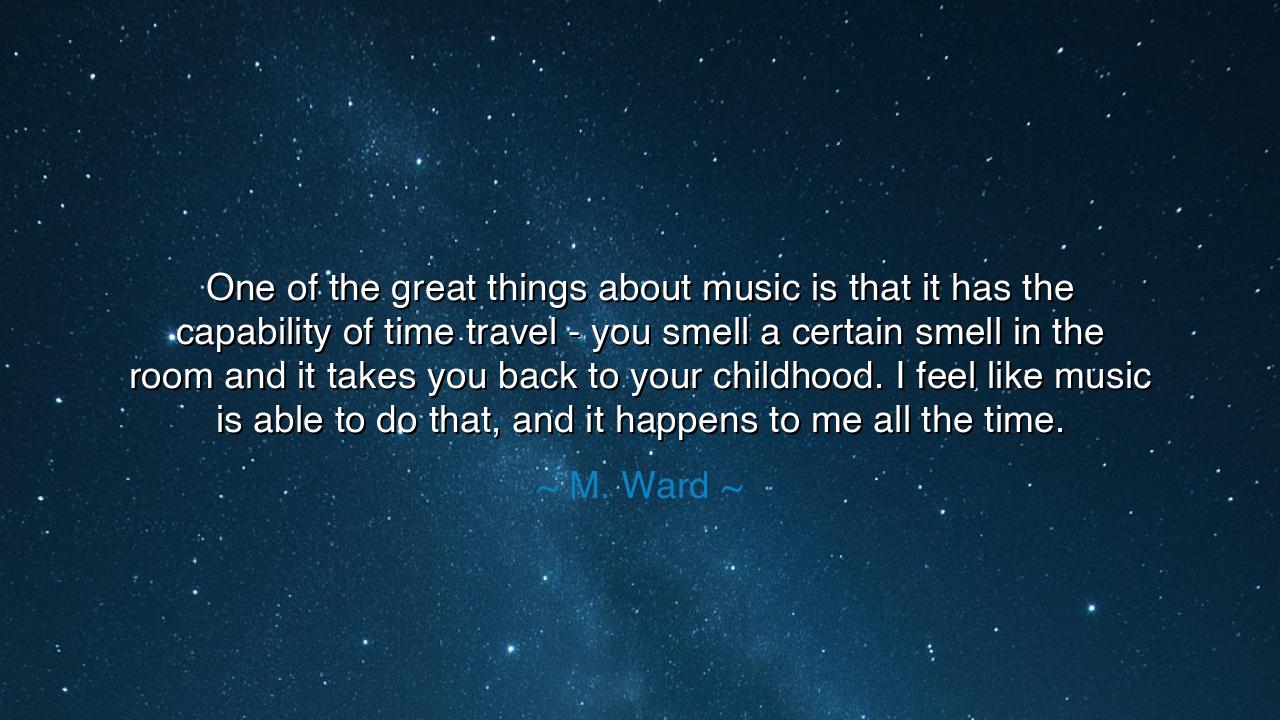
One of the great things about music is that it has the
One of the great things about music is that it has the capability of time travel - you smell a certain smell in the room and it takes you back to your childhood. I feel like music is able to do that, and it happens to me all the time.






M. Ward, the quiet troubadour of modern song, spoke with gentle wonder when he said: “One of the great things about music is that it has the capability of time travel — you smell a certain smell in the room and it takes you back to your childhood. I feel like music is able to do that, and it happens to me all the time.” In these words, he names music not merely as sound, but as a vessel of memory, a bridge across time, carrying us from the present moment back into the shadows and lights of days long gone. Music, for Ward, is not only melody — it is memory incarnate.
The ancients also understood this power. The Greeks sang hymns to the lyre and believed that music carried the echoes of eternity. The philosopher Plato declared that music is the most powerful art, for it enters the soul without asking permission and shapes it silently. They knew what M. Ward describes: that a simple tune could summon forth the face of a mother, the laughter of a friend, the feel of youth’s springtime. In the harmony of notes lies the miracle of time travel, where the past rises alive within the present.
History gives us many testimonies of this truth. When soldiers of the First World War heard familiar songs from home, they wept like children in the trenches. A tune played on a gramophone could carry them across the ocean, back into kitchens and churches and quiet fields they thought they might never see again. The mud and blood did not matter for those brief moments — music gave them back their lives, if only for the length of a song. That was time travel, as real as any journey across land or sea.
And so too in personal lives: think of the mother who hears a lullaby and remembers her child’s first days, though he is grown. Or the old man who hears the swing music of his youth and recalls dances, laughter, and loves long gone. These are not illusions; they are resurrections of memory, summoned by the sacred power of song. Music awakens the past more vividly than words or images, for it carries the rhythm of the heart itself.
Children of tomorrow, hear this: do not treat music as noise or background alone. Listen, for it is your bridge through time. It is the scroll upon which your memories are written. A song that enters your life today will one day carry you back to this very hour, long after years have passed. Treasure it, for music is memory given breath.
The lesson is clear: embrace music not only for its beauty in the moment, but for its power to preserve your life within it. Create soundtracks to your days, knowing that one day they will carry you back. And when you feel lost in time, let music guide you — for it is the truest key to unlock the chambers of the heart.
Practical action flows from this wisdom. When you travel, carry songs that will hold the memory of the journey. When you celebrate, let music stamp its seal upon the hour. And when you grieve, let it hold your sorrow gently, so that one day it may bring healing when recalled. Build your life with music, for it will serve as your timekeeper, your diary, your compass through memory.
So let it be remembered: “One of the great things about music is that it has the capability of time travel… it happens to me all the time.” These are not idle words, but testimony of a truth ancient and eternal: that music is more than art — it is the guardian of memory, the key to the soul’s journey through time. Listen, remember, and let it carry you.






AAdministratorAdministrator
Welcome, honored guests. Please leave a comment, we will respond soon